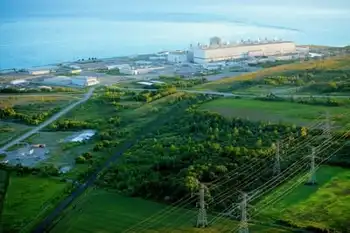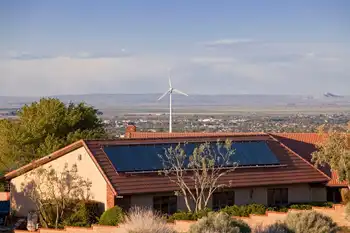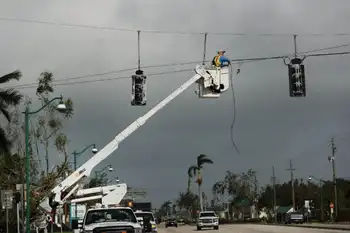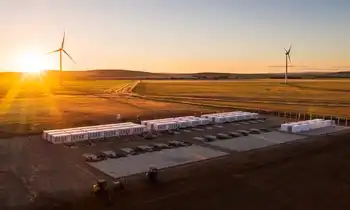School will teach Afghans how to build power systems
By Electricity Forum
CSA Z463 Electrical Maintenance -
Our customized live online or in‑person group training can be delivered to your staff at your location.

- Live Online
- 6 hours Instructor-led
- Group Training Available
Symbion Power, an American company with offices in the U.S., Cyprus, Iraq, Dubai, and Afghanistan, specializes in developing complex electrical infrastructure power projects in regions of the world where conflict and instability are major impediments to progress. Its ability to work in at-risk areas is due, in part, to the companyÂ’s commitment to training and employing indigenous people.
Over the last few years, Symbion has been building extensive systems in partnership with local companies throughout Iraq, including 300 miles of 400kV and 132kV transmission line and eleven 132KV substations. Symbion is rated amongst the top ten U.S. firms in the Iraq reconstruction market.
In Iraq, and other locales, Symbion Power has developed a unique approach to meet labor needs. Symbion identifies local firms and people who have the basic skills to handle the work and then provides additional training. In addition to the training school, Symbion will work with World Monitors, a consulting group geared towards establishing human rights standards across the globe, to research and create guidelines and a code of conduct for the construction industry in Afghanistan. Symbion will implement these standards and set the bar for other companies in that area and the Middle East.
“The objective is to help local people generate skills and ultimately build their own companies that can undertake additional work in the future and foster a new economy in Afghanistan,” said Paul Hinks, Symbion Power CEO. “We believe this approach, along with setting the standard for labor, will contribute to greater efficiency on our part and savings for our clients. It represents the right kind of long-term sustainable investment in the communities in which we work.”
Northwest Lineman College president, Aaron Howell, commented, “NLC and its employees have the opportunity to help in the reconstruction efforts of the Afghanistan electrical system. Pursuant to US policy and philosophy, reconstruction of the power system is a first step in creating a more stable Afghanistan. NLC is honored to be working with Symbion Power, AREVA T&D, and the people of Afghanistan on this very important project.”
Poor electrical systems throughout Afghanistan are major impediments to development. Decades of war damage, along with poor maintenance, lack of funds and technical capacity has left the system, which never reached more than 22 percent of the population, in a dire state.
It is estimated that only 70 percent of the already substandard electrical system survived the conflicts over the last 25 years. According to the Ministry of Energy and Water (Power Sector Strategy for the Afghanistan National Development Strategy, April 15, 2007), only seven percent of the population currently has access to power. Going forward, the Ministry hopes to reach 33 percent of the population by 2015 and 90 percent in key urban areas.
While Symbion was able to identify skilled local individuals and companies in Iraq, in Afghanistan there is a tremendous shortage of skilled labor. And, just like in Iraq, security conditions in Afghanistan make it impossible to use expatriate personnel in some areas of the country.
“We decided to expand our ‘build locally’ program because we believe it is the only way you can bring these projects to fruition – and it is the right thing to do as we all work to assist the people of Afghanistan,” Hinks said.
Don Brindle, Training Manager said, “Symbion is making a large investment in Afghanistan to train local people. We recognize that we need to do this and we are all excited because we are helping people acquire new skills. This country has seen so much turmoil over so many years. We hope our efforts will help many people directly by the high-quality training, and also indirectly through the provision of electricity."
Symbion approached Northwest Lineman College to assist in the effort. Northwest Lineman College, with campuses in California and Idaho, provides power delivery training to over 2,000 line workers annually in the U.S. and abroad. The school develops customized academic and field training solutions and delivers instruction that results in a highly skilled and motivated workforce.
It has created a unique curriculum for the new trainees to address the specific skills that will be necessary to construct, maintain, and operate the new power delivery system in Afghanistan. This is a critical first step in building and fostering future training and growth among the people in Afghanistan.
Symbion has identified Afghans from across the country that will become trainees at the Symbion Power Center. The program provides a secure and enriching environment that will teach basic power system work skills, and also encourage longer-term, more sophisticated training and development as the power system grows in the country.
AREVA T&D, which has worked extensively in emerging countries in the Middle East, Asia and Africa to build power networks, will participate in the Afghanistan project with Symbion. AREVA T&D worked on several projects with Symbion in Iraq; it will provide substation equipment for training purposes, and will assist with specialized training in Afghanistan and Europe on the installation and maintenance of substations.
“AREVA T&D has developed a worldwide reputation for providing quality power infrastructures in emerging countries,” Edgar Scholz, Unit Managing Director of AREVA T&D Systems Germany, said. “We are delighted once again to be participating with Symbion on this exciting project that will develop an electrical transmission network and promote a new workforce that will be a cornerstone for successful economic development in Afghanistan.”
Symbion is covering all costs associated with the project, including construction of the school facility, the Symbion Power Center, in Kabul. The school building is currently being renovated and the area for the towers de-mined.
Beyond training an indigenous workforce, Symbion Power will provide the most promising trainees with micro-loans so they can purchase equipment and create their own electrical construction companies. The goal is to create three to four Afghan companies across the country so they can work for their own government within the next three to four years.
“Our hope is that long after these projects are completed, the people we have trained will be building and servicing electrical power projects in their own country,” Hinks said. “Of course it is good for our business – and others – to have that infrastructure in place. But most importantly it is good for these communities and the entire country.”











